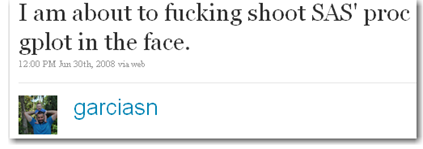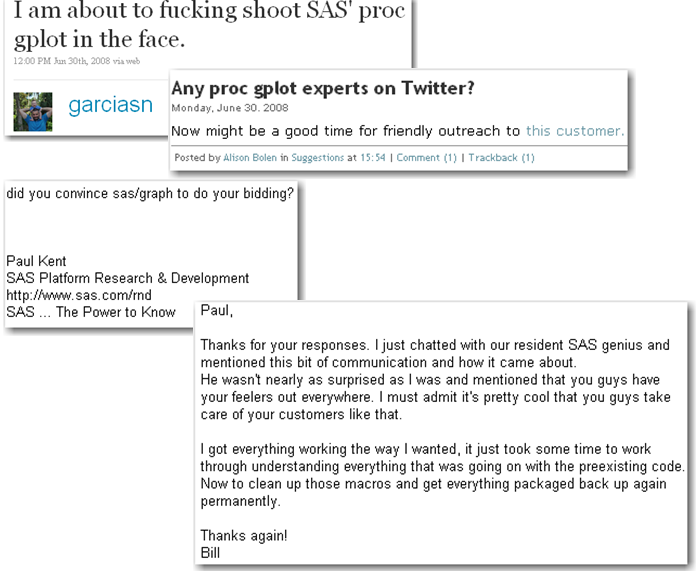Once upon a time, almost three years ago, before most of us ever heard of Twitter, I was just signing up for the service and starting to follow anyone that I found who might be there talking about SAS.
I used Twitter Search and I didn't find a lot. Some people would mention SAS job postings. A few others would describe learning about SAS programming in a college course. Many, many others were talking about the other dozens of things that SAS might stand for. There wasn't a lot worth responding to or forwarding on to others. And then I saw this:

When the experts tell you to "listen for a point of need," I'm pretty sure this is what they mean. But what could I do? I'm not a PROC GPLOT expert, and we didn't - at the time - have even an informal process for routing complaints on Twitter to someone who could respond.
So I blogged about it on my internal blog on the SAS intranet. Luckily, a few research and development employees saw my post and forwarded it to Paul Kent, a vice president of research and development who reached out to Bill (aka @garciasn) after doing some quick research to find his address. Here's how it turned out:

As you can see from the exchange, Bill's problem was already solved before Paul reached out to him. But Bill was instantly impressed that his complaint had attracted the attention of a VP who offered to help.
Like most things on the Web, that impression had ripple effects. Bill's friend Aaron Landry started using the exchange as an example of social media done right when he spoke at conferences about Web 2.0 101.
Even more importantly, Bill became a strong advocate for SAS on Twitter. Today, he speaks at SAS user group conferences and regularly banters back and forth on Twitter with friends like @waynettetubs, the editor of the SAS Tech Report and a favorite among SAS users.
What happens when you can scale that type of response with a conversation center for listening and response? Sure, you can't put a VP on every response - but you can take quick, smart actions and - in many cases - turn unhappy customers into happy advocates for your company over and over again.

6 Comments
This blog is hilarious. I can second this experience. I've received email from Paul also and a phone call from a couple of SAS experts after posting on twitter. I think it was when SAS 9.2 was new and required a couple of elephants sacrificed to get the install to work. I was very surprised and impressed.
Many of us like these kinds of "real world" customer interactions (well, most don't use that kind of language). The only customer exposure lots of us in R&D used to get was at SUGI (now SAS Global Forum), and that's really a SAS love fest. Social media forums (like Twitter, StackOverflow, etc.) open up lots of new avenues (hi, @annmariastat) and opportunities to help. It's time consuming, though. Thanks, Alison, for paving this new SAS-customer interaction super highway.
Thanks AnnMaria. It was fun to finally write it up. Now, we should write up your story, elephants and all. Or, you probably already have!
Thank you fellow road paver. It is a whole new world!
I love your blog and would love to guest post an educational article I have written pertaining to social media and the conflict in Egypt. If you are interested please email me for more information.
T. Morrison
twmorrison75@gmail.com
http://twitter.com/twmorrison75
Hi Thomas. Thanks for reading! We're actually working on formal policies right now for blog contributions from outside SAS, so guest posts may be possible soon. I'll send you more details via email.